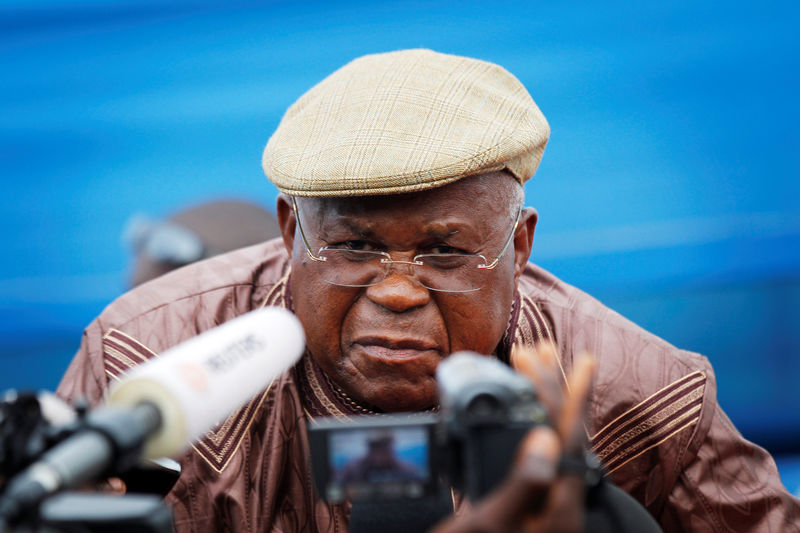By Aaron Ross
KINSHASA (Reuters) - The dates below the framed black-and-white photograph of Etienne Tshisekedi in the reception hall of the prime minister's offices in Democratic Republic of Congo's capital, Kinshasa, testify to a fraught and complicated relationship with power.
Tshisekedi, who died on Wednesday in Brussels at 84, was named prime minister four times of the country then known as Zaire, between 1991 and 1997.
His longest stint lasted three-and-a-half months; the shortest just five days after he purposely omitted a reference to autocratic ruler Mobutu Sese Seko as "guarantor of the nation" from his oath of office, and was promptly fired.
Nicknamed "the Sphinx" for not speaking much but causing a lot of trouble when he did, Tshisekedi was a crusading voice for political pluralism and democracy in Congo, whose politics since independence in 1960 from Belgium has been marred by foreign intervention, civil war, coups and authoritarian rule.
While his popularity in Congo made him impossible to ignore, his legendary irascibility may have thwarted his hopes of reaching the summit of Congolese politics.
Now, as Congo experiences its latest political crisis over President Joseph Kabila's failure to step down at the end of his constitutional mandate last December, Tshisekedi's absence will test Congo's divided and often ineffectual opposition.
Tshisekedi began his political career as a close loyalist of Mobutu but broke ranks in 1982 to found the Union for Democracy and Social Progress (UDPS).
As the first organised opposition platform at a time of strict one-party rule, the UDPS endured harsh repression and Tshisekedi was repeatedly imprisoned. But he tapped into widespread discontent as Mobutu's kleptocratic rule entered its third decade and the appeal of his calls to Zairean "authenticity" wore thin.
UNREALISED POTENTIAL
The post-Soviet democratic wave that swept across Africa forced Mobutu to accede to multi-partyism in 1990, but he held onto power for another seven years.
He finally fell in 1997 to an invasion by Rwanda, Uganda and other neighbouring countries in support of a rebel movement led by Laurent Kabila. That war and a subsequent 1998-2003 regional conflict killed millions of Congolese, most from hunger and disease.
Under the rules of Laurent Kabila and his son, Joseph, who took power in 2001 after Laurent's assassination, Tshisekedi reprised his role as opposition leader, presiding over a UDPS party installed across the vast central African country.
But many, including some collaborators, thought his legendary stubbornness and disdain for what he perceived to be the establishment squandered repeated opportunities to unseat entrenched rulers.
He called for a boycott of the 2005 constitutional referendum and also sat out the 2006 presidential vote, Congo's first free elections in over 40 years, won by Joseph Kabila.
He finished runner-up to Kabila in the 2011 presidential election, a vote international observers said was marred by widespread fraud.
Foreign diplomats and investors were wary of the unpredictable Tshisekedi who, in turn, harboured lingering suspicions of the western powers who had backed the anti-communist Mobutu during the Cold War.
"He's someone who attacked ferociously but didn't know how to take power," said Jean Omasombo, Congo expert at the Royal Central Africa Museum in Belgium.
He spent much of his latter years outside the country receiving medical treatment as Congo spiralled toward constitutional crisis.
Dozens have died in anti-government protests over the last two years, including about 40 last month when Kabila failed to step down at the end of his term.
Under a deal cut on Dec. 31, Tshisekedi was set to take the top post in a transitional council that would oversee Kabila's exit by the end of this year.
His son, Felix Tshisekedi is tipped to be named prime minister in a forthcoming power-sharing government, though no other opposition leader has proved able to match his mobilising prowess or reputation for principled opposition.

"Etienne Tshisekedi represented true political resistance in our country," said Chantal Muya, a law student, hours after the leader's death. "We don't know what will come after Tshisekedi."